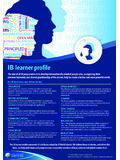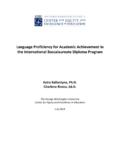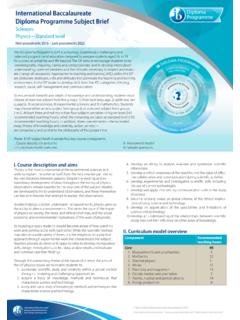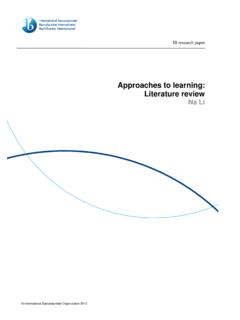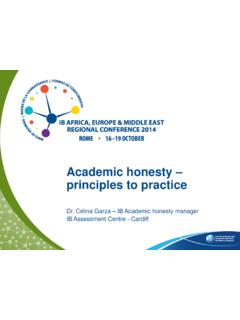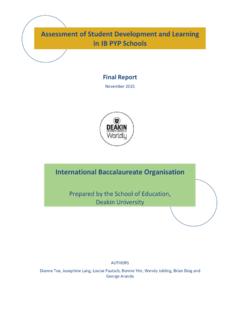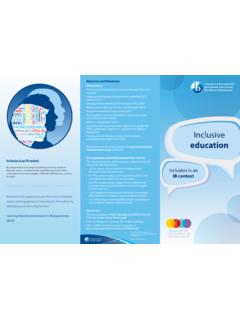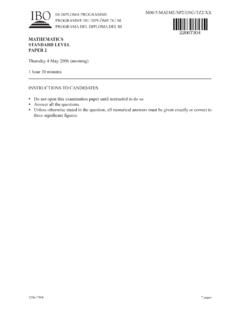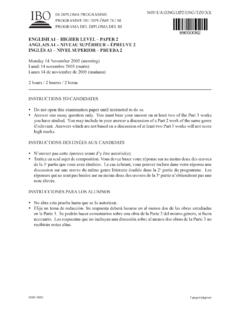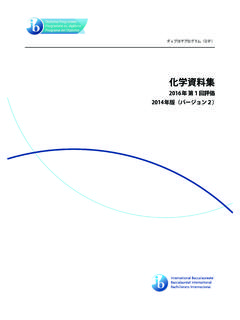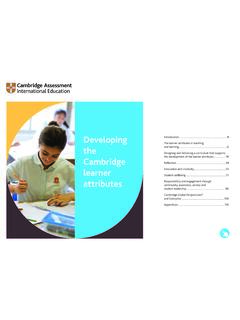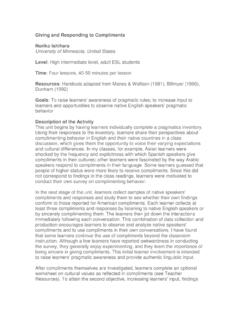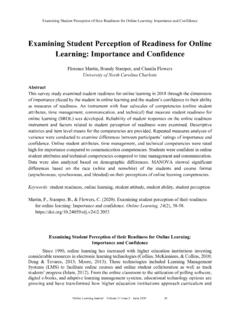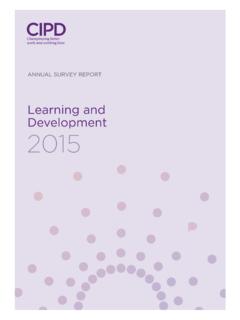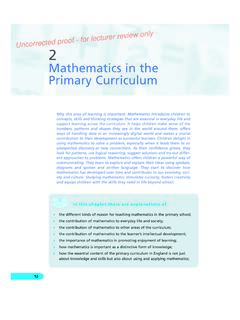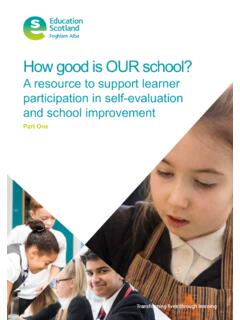Transcription of Academic integrity - International Baccalaureate
1 Academic integrityAcademic integrityPublished October 2019 Published on behalf of the International Baccalaureate Organization, a not-for-profit educational foundation of 15 Route des Morillons, 1218 Le Grand-Saconnex, Geneva, Switzerland by theInternational Baccalaureate Organization (UK) Ltd Peterson House, Malthouse Avenue, Cardiff Gate Cardiff, Wales CF23 8GL United Kingdom Website: International Baccalaureate Organization 2019 The International Baccalaureate Organization (known as the IB) offers four high-quality and challenging educational programmes for a worldwide community of schools, aiming to create a better, more peaceful world. This publication is one of a range of materials produced to support these IB may use a variety of sources in its work and checks information to verify accuracy and authenticity, particularly when using community-based knowledge sources such as Wikipedia.
2 The IB respects the principles of intellectual property and makes strenuous efforts to identify and obtain permission before publication from rights holders of all copyright material used. The IB is grateful for permissions received for material used in this publication and will be pleased to correct any errors or omissions at the earliest rights reserved. No part of this publication may be reproduced, stored in a retrieval system, or transmitted, in any form or by any means, without the IB s prior written permission, or as expressly permitted by the Rules for use of IB Intellectual merchandise and publications can be purchased through the IB Store (email: Any commercial use of IB publications (whether fee-covered or commercial) by third parties acting in the IB s ecosystem without a formal relationship with the IB (including but not limited to tutoring organizations, professional development providers, educational publishers and operators of curriculum mapping or teacher resource digital platforms etc) is prohibited and requires a subsequent written license from the IB.)
3 License requests should be sent to More information can be obtained on the IB public integrityInternational Baccalaureate , Baccalaur at International , Bachillerato Internacional and IB logos are registered trademarks of the International Baccalaureate mission statementThe International Baccalaureate aims to develop inquiring, knowledgeable and caring young people who help to create a better and more peaceful world through intercultural understanding and this end the organization works with schools, governments and International organizations to develop challenging programmes of International education and rigorous programmes encourage students across the world to become active, compassionate and lifelong learners who understand that other people, with their differences, can also be learner profile Iprofile IB learner parner profile IB leaile IB learner profiIB learner profile Ier profile IB learne Inter national Baccalaureate Organization 2017 Inter national Baccalaureate | Baccalaur at I nter national | Bachillerato Inter nacional The IB learner pro le represents 10 attributes valued by IB World Schools.
4 We believe these attributes, and others like them, can help individuals and groups become responsible members of local, national and global nurture our curiosity, developing skills for inquiry and research. We know how to learn independently and with others. We learn with enthusiasm and sustain our love of learning throughout develop and use conceptual understanding, exploring knowledge across a range of disciplines. We engage with issues and ideas that have local and global signi cance. We use critical and creative thinking skills to analyse and take responsible action on complex problems. We exercise initiative in making reasoned, ethical express ourselves con dently and creatively in more than one language and in many ways. We collaborate e ectively, listening carefully to the perspectives of other individuals and act with integrity and honesty, with a strong sense of fairness and justice, and with respect for the dignity and rights of people everywhere.
5 We take responsibility for our actions and their critically appreciate our own cultures and personal histories, as well as the values and traditions of others. We seek and evaluate a range of points of view, and we are willing to grow from the show empathy, compassion and respect. We have a commitment to service, and we act to make a positive di erence in the lives of others and in the world around understand the importance of balancing di erent aspects of our lives intellectual, physical, and emotional to achieve well-being for ourselves and others. We recognize our interde-pendence with other people and with the world in which we thoughtfully consider the world and our own ideas and expe-rience. We work to understand our strengths and weaknesses in order to support our learning and personal approach uncertainty with forethought and determination; we work independently and cooperatively to explore new ideas and innovative strategies.
6 We are resourceful and resilient in the face of challenges and learner profileThe aim of all IB programmes is to develop internationally minded people who, recognizing their common humanity and shared guardianship of the planet, help to create a better and more peaceful IB learners we strive to be:THE IB LEARNER PROFILEI ntroduction 1 Purpose of this policy 1 Scope of this policy2A principled approach to Academic integrity3 What is Academic integrity ?3 Why do we need Academic integrity ?5 Expectations and responsibilities of the school community7 The school leadership team7 Programme coordinators11 Teaching and non-teaching staff13 Students15 Parents and legal guardians17 Investigating school maladministration or student Academic misconduct19 Overview19 School maladministration20 Student Academic misconduct23 Appendices27 Appendix 1: School maladministration27 Appendix 2: Student Academic misconduct31 Appendix 3: Plagiarism46 Appendix 4: Statement templates for investigations48 ContentsAcademic integrityAs part of the IB s educational goal to award reliable, fair and recognized outcomes to our students through valid assessments, this policy has been created to ensure a common understanding of the IB s Academic integrity principle.
7 Results cannot be fair if some students have had an unreasonable advantage over integrity is a responsibility of the whole IB community. By making the IB s commitment to Academic integrity transparent, this document outlines the responsibilities and expectations of different stakeholders across the IB community. This policy also documents how the IB manages incidents of student Academic misconduct and school maladministration cases, ensuring confidence is maintained among students, parents, schools and other stakeholders in the value and credibility of IB policy document explains: the Academic integrity principle which will be observed by the IB and expected of all its stakeholders the expectations and responsibilities of the different groups of stakeholders in upholding the IB s principle of Academic integrity the terminology used by the IB regarding Academic integrity , student Academic misconduct and school maladministration how the IB deals with student Academic misconduct and school maladministration good practice in embodying teaching and learning in a culture of Academic integrity good practice for schools in their own Academic integrity approaches and culture the broad definitions of terms to allow conversations about Academic integrity at school of this policy 1 Academic integrityThis policy applies to and should be read by.
8 All IB World School leadership teams, administrators and the wider community responsible for creating and implementing the Academic integrity policy all IB World School members of staff responsible for the teaching and preparation of work submitted to the IB for assessment all IB World School members of staff responsible for the delivery of IB examinations all students going through assessment and submitting work to the IB parents and legal guardians of IB students going through of this policy2 Academic integrityAcademic integrity is a guiding principle in education and a choice to act in a responsible way whereby others can have trust in us as individuals. It is the foundation for ethical decision-making and behaviour in the production of legitimate, authentic and honest scholarly integrity goes beyond a definition and a well-structured school policy; it should also be part of an ethical culture of any educational institution, be that a primary school or a university.
9 It is an obligation which must be embraced and fostered by the entire school community, so students continue their future life, whether in higher education or in the workplace, in strict adherence to this an Academic integrity culture, and a personal positive attitude towards it, requires the design of a school strategy that combines policies and good Academic practice, while understanding the fundamental dimension it has in the authentic construction of meaning and learning in all IB guiding principle of Academic integrity can be seen as built up from a number of simpler concepts in education, that can start early during the PYP, be reinforced during the MYP and cemented later through the DP and CP. Expectations should be clearly communicated and modelled at an age appropriate level so that all IB students understand: their responsibility for producing authentic and genuine individual and group work how to correctly attribute sources, acknowledging the work and ideas of others the responsible use of information technology and social media how to observe and adhere to ethical and honest practice during supporting IB students in their learning should understand their own central role in developing the approaches to learning and reinforce the principle of Academic integrity through all teaching, learning and assessment practices.
10 For more information see the document Academic honesty in the IB educational termsThese are some key terms which are used in this integrity Academic integrity is a guiding principle in education and a choice to act in a responsible way whereby others can have trust in us as individuals. It is the foundation for ethical decision-making and behaviour in the production of legitimate, authentic and honest scholarly maladministrationThe IB defines school maladministration as an action by an IB World School or an individual associated with an IB World School that infringes IB rules and regulations, and potentially threatens the integrity of IB examinations and assessments. It can happen before, during or after the completion of an assessment component or completion of an Academic misconductThe IB defines student Academic misconduct as deliberate or inadvertent behaviour that has the potential to result in the student, or anyone else, gaining an unfair advantage in one or more components of that may disadvantage another student is also regarded as Academic misconduct.
